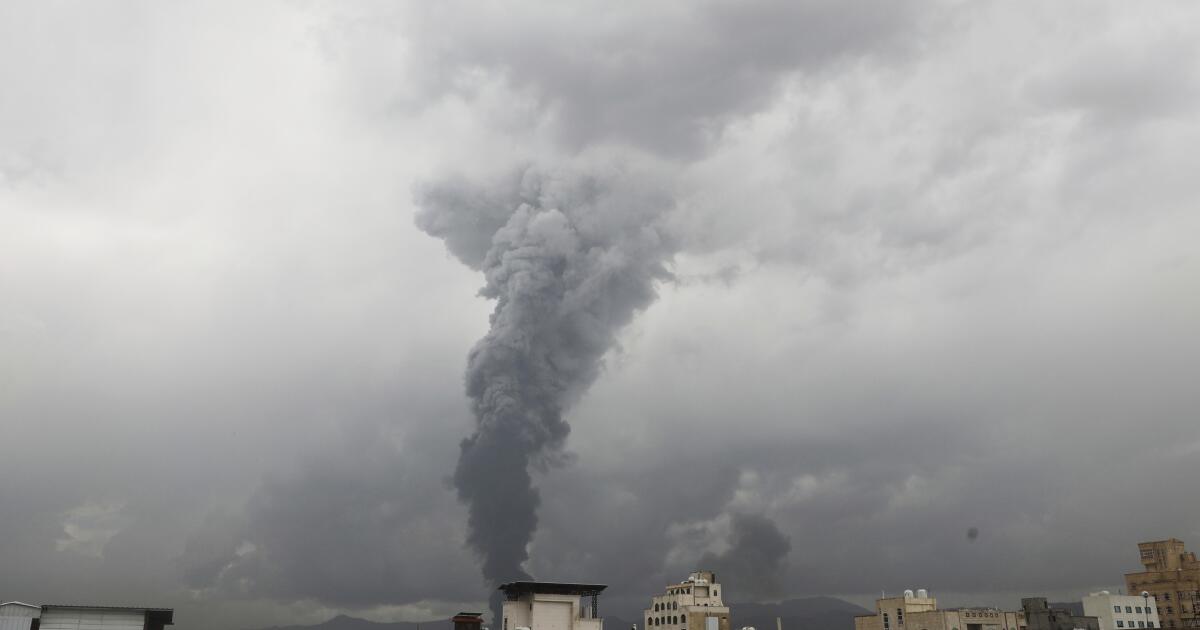CAIRO — Israeli airstrikes hit Yemen’s capital on Sunday, just days after the Houthi rebels launched a missile toward Israel that its military described as the first cluster bomb the rebels had fired at it since 2023.
The Iranian-backed Houthis said the strikes hit multiple areas across Sanaa. The Houthi-run Health Ministry said that at least two people were killed and 35 others were wounded.
The rebels’ Al-Masirah satellite television reported a strike on an oil company, and video on social media showed a fireball erupting there.
Israel’s military said it struck the Asar and Hizaz power plants, calling them “a significant electricity supply facility for military activities,” along with a military site where the presidential palace is located.
Sanaa residents told the Associated Press they heard loud explosions near a closed military academy and the presidential palace. They said they could see plumes of smoke near Sabeen Square, a central gathering place in the capital.
“The sounds of explosions were very strong,” said Hussein Mohamed, who lives close to the presidential palace.
Ahmed al-Mekhlafy said he felt the sheer force of the strikes. “The house was rocked, and the windows were shattered,” he told the AP by phone.
The Houthis have launched missiles and drones toward Israel and targeted ships in the Red Sea for more than 22 months, saying they are attacking in solidarity with Palestinians amid the war in Gaza.
Nasruddin Amer, deputy head of the Houthi media office, said the latest airstrikes won’t deter the rebels, and vowed to continue attacks on Israel.
“Our military operations supporting Gaza won’t stop, God willing, unless the aggression is stopped, and the siege is lifted,” he wrote on social media.
The Israeli strikes were the first to hit Yemen since a week ago, when Israel said it targeted energy infrastructure it believed was used by the rebels.
The latest strikes follow the Houthis’ claim of launching a newly equipped missile toward Israel on Friday, including targeting the country’s largest airport, Ben Gurion, outside Tel Aviv. There was no reported damage or injuries. Israel’s military said it fragmented midair after several interception attempts.
An Israeli air force official, speaking on condition of anonymity in line with military regulations, called the projectile fired Friday a new threat. It was a cluster munition, he said, meant to detonate into multiple explosives on impact.
The use of cluster bombs makes Israeli interception more difficult and represents additional technology provided to the Houthis by Iran, the official asserted.
The official said more than 10 Israeli fighter jets carried out Sunday’s strikes.
Houthi attacks over the last two years have upended shipping in the Red Sea, through which about $1 trillion of goods passes each year.
From November 2023 to December 2024, the Houthis targeted more than 100 ships with missiles and drones. The rebels stopped their attacks during a brief ceasefire in the Gaza Strip and later became the target of a weeks-long airstrike campaign ordered by President Trump.
In May, the United States announced a deal with the Houthis to end the airstrikes in return for an end to shipping attacks, although the rebel group said the agreement did not include halting attacks on targets it believed were aligned with Israel.
In May, Israeli airstrikes hit the Sanaa airport in a rare daytime attack that destroyed the terminal and left craters in its runway. At least six passenger planes were hit, including three belonging to Yemenia Airways, according to airport authorities.
Magdy, Lidman and Metz write for the Associated Press and reported from Cairo, Tel Aviv and Jerusalem, respectively. AP writer Jon Gambrell in Dubai contributed to this report.
